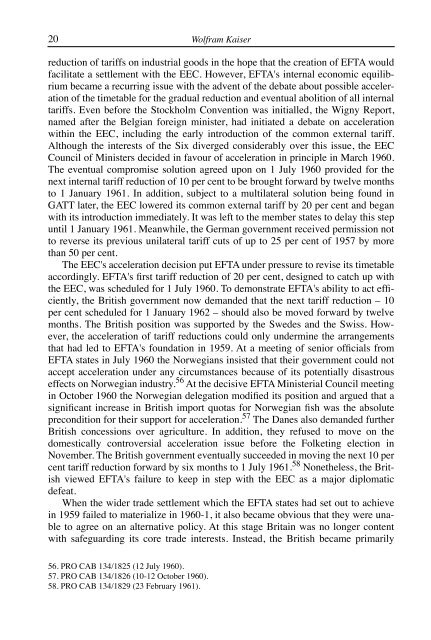Journal of European Integration History – Revue d'histoire de l'
Journal of European Integration History – Revue d'histoire de l'
Journal of European Integration History – Revue d'histoire de l'
- No tags were found...
Create successful ePaper yourself
Turn your PDF publications into a flip-book with our unique Google optimized e-Paper software.
20Wolfram Kaiserreduction <strong>of</strong> tariffs on industrial goods in the hope that the creation <strong>of</strong> EFTA wouldfacilitate a settlement with the EEC. However, EFTA's internal economic equilibriumbecame a recurring issue with the advent <strong>of</strong> the <strong>de</strong>bate about possible acceleration<strong>of</strong> the timetable for the gradual reduction and eventual abolition <strong>of</strong> all internaltariffs. Even before the Stockholm Convention was initialled, the Wigny Report,named after the Belgian foreign minister, had initiated a <strong>de</strong>bate on accelerationwithin the EEC, including the early introduction <strong>of</strong> the common external tariff.Although the interests <strong>of</strong> the Six diverged consi<strong>de</strong>rably over this issue, the EECCouncil <strong>of</strong> Ministers <strong>de</strong>ci<strong>de</strong>d in favour <strong>of</strong> acceleration in principle in March 1960.The eventual compromise solution agreed upon on 1 July 1960 provi<strong>de</strong>d for thenext internal tariff reduction <strong>of</strong> 10 per cent to be brought forward by twelve monthsto 1 January 1961. In addition, subject to a multilateral solution being found inGATT later, the EEC lowered its common external tariff by 20 per cent and beganwith its introduction immediately. It was left to the member states to <strong>de</strong>lay this stepuntil 1 January 1961. Meanwhile, the German government received permission notto reverse its previous unilateral tariff cuts <strong>of</strong> up to 25 per cent <strong>of</strong> 1957 by morethan 50 per cent.The EEC's acceleration <strong>de</strong>cision put EFTA un<strong>de</strong>r pressure to revise its timetableaccordingly. EFTA's first tariff reduction <strong>of</strong> 20 per cent, <strong>de</strong>signed to catch up withthe EEC, was scheduled for 1 July 1960. To <strong>de</strong>monstrate EFTA's ability to act efficiently,the British government now <strong>de</strong>man<strong>de</strong>d that the next tariff reduction <strong>–</strong> 10per cent scheduled for 1 January 1962 <strong>–</strong> should also be moved forward by twelvemonths. The British position was supported by the Swe<strong>de</strong>s and the Swiss. However,the acceleration <strong>of</strong> tariff reductions could only un<strong>de</strong>rmine the arrangementsthat had led to EFTA's foundation in 1959. At a meeting <strong>of</strong> senior <strong>of</strong>ficials fromEFTA states in July 1960 the Norwegians insisted that their government could notaccept acceleration un<strong>de</strong>r any circumstances because <strong>of</strong> its potentially disastrouseffects on Norwegian industry. 56 At the <strong>de</strong>cisive EFTA Ministerial Council meetingin October 1960 the Norwegian <strong>de</strong>legation modified its position and argued that asignificant increase in British import quotas for Norwegian fish was the absoluteprecondition for their support for acceleration. 57 The Danes also <strong>de</strong>man<strong>de</strong>d furtherBritish concessions over agriculture. In addition, they refused to move on thedomestically controversial acceleration issue before the Folketing election inNovember. The British government eventually succee<strong>de</strong>d in moving the next 10 percent tariff reduction forward by six months to 1 July 1961. 58 Nonetheless, the Britishviewed EFTA's failure to keep in step with the EEC as a major diplomatic<strong>de</strong>feat.When the wi<strong>de</strong>r tra<strong>de</strong> settlement which the EFTA states had set out to achievein 1959 failed to materialize in 1960-1, it also became obvious that they were unableto agree on an alternative policy. At this stage Britain was no longer contentwith safeguarding its core tra<strong>de</strong> interests. Instead, the British became primarily56. PRO CAB 134/1825 (12 July 1960).57. PRO CAB 134/1826 (10-12 October 1960).58. PRO CAB 134/1829 (23 February 1961).
















